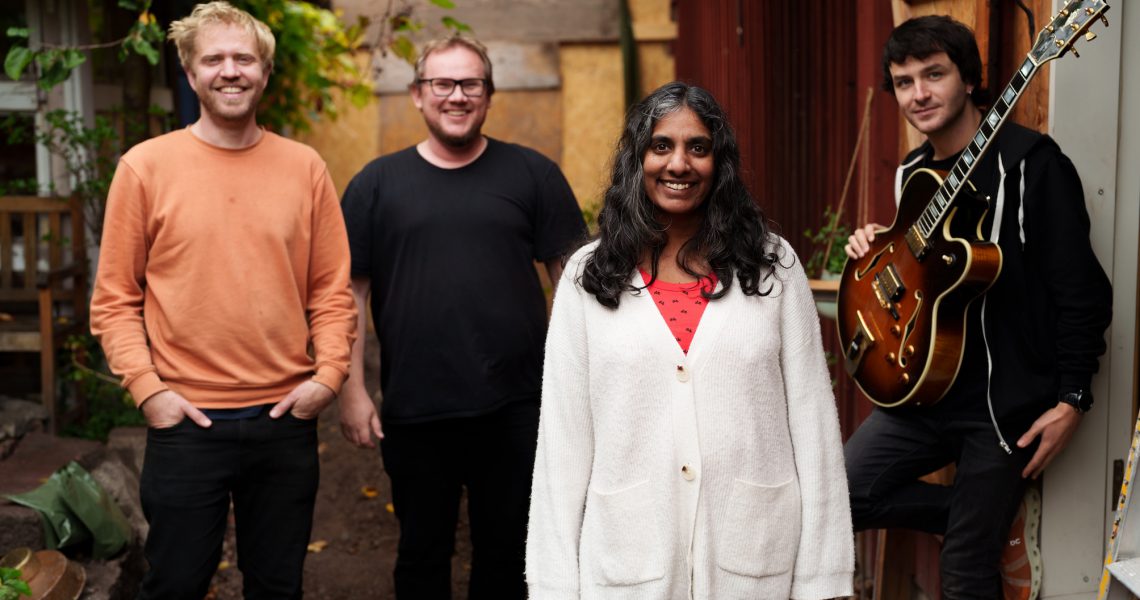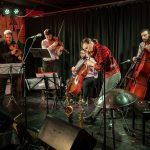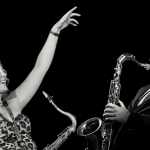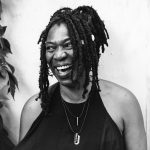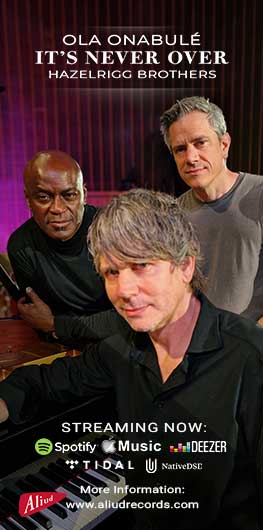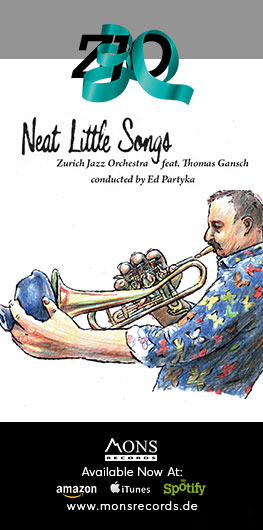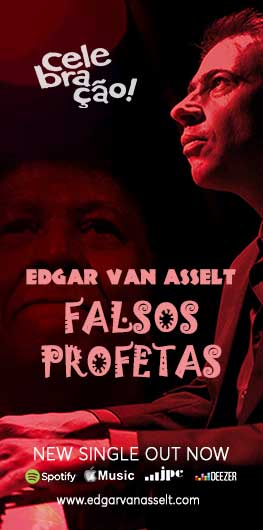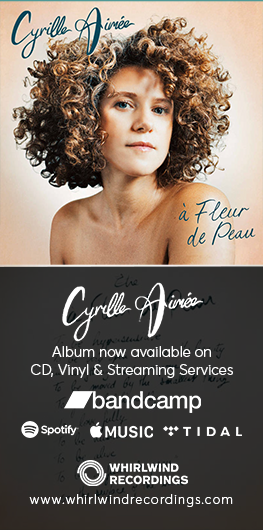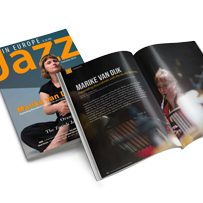Hailing from Sweden, Vidya is an intuitive performer and composer, who tunes in to the processes within her body, mind and soul. For her newest release Adi Shakti, Vidya has dug deep into her past and present, exploring her adoptive past as well as the loss of her mother. It is an incredibly moving and emotive record, which tells Vidya’s story through eclectic compositions and arrangements. In conversation with her, we explored these themes in further detail, as well as what she has been up to over the last year since the albums release…
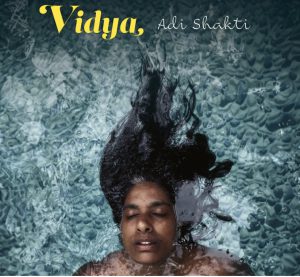 Can you tell me a bit more about that, the topic that inspired the album, and all of these themes around it?
Can you tell me a bit more about that, the topic that inspired the album, and all of these themes around it?
I guess I have to start with the last album, The Papillon, which is about the longing, the searching, the finding, and ultimately, the losing of my biological mother. I found her in 2017, I think. And when I became happy about that, she disappeared. I mean, she was gone. And I made this album The Papillion, and it came out 2022. Then I found out my mother here in Sweden was sick, with cancer, so I was between thinking: Should I continue or What shall I do? Because we had to take care of her, but everything was quite okay. She was quite well, you know, even if she was sick. I could do the album. And I think it was two months after the album was released, she died. It was very fast. I have been carrying this poem by Rumi, a Persian poet. I have a book with the Rumi poems. I got it when I was working at a book store when I was younger, in my 20s, and I love that book. I love that poem:
‘Beyond ideas of right doing and wrongdoing, there’s a field, I’ll meet you there. ‘
During my life, I’ve always been looking for a space and place, which was mine. When you are from an adoption background, you are here because someone else has told you, we want you here. So, it was important for me, and always has been important for me to find my own space. And then music started to come from the poem and I had gotten to know the guitarist Rob Luft through my drummer Jon Fält. I was actually in London, when I was doing a little gig after releasing ‘The Papillon’ when I got the call about playing with Rob. I love when people introduce new things fast. It’s like improvisation, and you don’t know, what’s going to happen. Once I’ve worked on something a long time, I like to rattle it around and make it less stiff. I didn’t know who Rob was and he came to this release concert in Stockholm to play with us. He seemed to really, really like my music. And then I thought, okay, maybe now it’s time to ask to co-compose with someone, which I’ve never done before. Maybe I dare to ask him, maybe he will say yes. I went to London, with this poem inside of me. I got funding and everything began to come together in a flow.
We made these two songs, The Field and Desert Blues, on the album and the cooperation was really nice. I was there and I didn’t know him that well. And the first thing I said was, okay, this has happened, about my mother. But then I said, ‘I have this poem I want to compose from. And this is what I think will happen now with all my music.’ It got really still in the room, and he really took in what I said. Then we started to play and The Field came about. I’m familiar with some mantras, since I do yoga, and also teach yoga. With the Adi Shakti mantra, I had made a song and made that song earlier for a yoga class. And I realized these two fits together really well, with the state of mind I’m in and what I want to say. It felt really good to call the album Adi Shakti, I really loved it. Also, I’m Indian origin, it made sense.
How did you incorporate that poem? In what ways? Was it musical or was it lyrical? Did you use actual lines from the poem? Was it just a feel of what the poem was about?
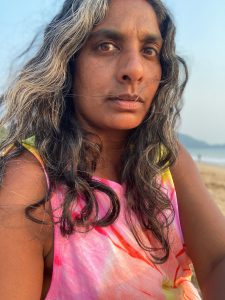 Oh, good question. All of that, I would say. The song that is called ‘The Field’ is clearly a line but it wasn’t like I decided that, it just came. There’s a place I want to go with my lonely heart, with my woman love, to the No More. And the No More for me means a place where there’s nothing else going on. That is what I interpret the poems essence to be. And it was really the essence of the poem that made me want to do the album and explore. I think people may think my songs are poetic, but it’s more to the point for me. It’s quite structured. But then when you put it all together, with the music, and then you start to speak a little bit instead of singing, then it becomes a poem. So, my lonely heart, my woman love. For me, it’s two things that I need to express. I’m quite analytic in a way, people don’t really think that, they get swept away, maybe by the music. But inside, I really am a person who needs to clarify things in a quite direct way. But the music around it makes it a bit floatier.
Oh, good question. All of that, I would say. The song that is called ‘The Field’ is clearly a line but it wasn’t like I decided that, it just came. There’s a place I want to go with my lonely heart, with my woman love, to the No More. And the No More for me means a place where there’s nothing else going on. That is what I interpret the poems essence to be. And it was really the essence of the poem that made me want to do the album and explore. I think people may think my songs are poetic, but it’s more to the point for me. It’s quite structured. But then when you put it all together, with the music, and then you start to speak a little bit instead of singing, then it becomes a poem. So, my lonely heart, my woman love. For me, it’s two things that I need to express. I’m quite analytic in a way, people don’t really think that, they get swept away, maybe by the music. But inside, I really am a person who needs to clarify things in a quite direct way. But the music around it makes it a bit floatier.
How would you describe your musical style? What words would you use to describe it?
I don’t really think about it. It’s something I had to think about. Because other people categorize you. For my first album I was reviews for the biggest paper in Sweden. And they were like ‘Oh, she sounds like… And this sound is blah, blah, blah.’ And I had never even heard of those people. So, I don’t really think about that. But what I do think about is that I need to be free. It’s really important for me to be free. And I think that improvisation is a way to be free. And that’s why I do jazz. But that’s because its jazz people talk about improvisation.
Do you use musical features from your Indian heritage? In your music? Do you like to combine?
I think it just happens naturally. I don’t think about it. Well, what I’ve been thinking about is, who am I? Where do I come from? I don’t have the origin; I’m still exploring and realizing that I’m Indian, in Sweden. I need to mix them in together in a way that makes me comfortable. I guess that’s what I’m doing.
Do you use any features of Swedish music?
I’m a Swedish, cultured person. And I listen to Swedish music. I grew up in Sweden with the Swedish music. And obviously, that affected me in many ways. But I’ve always been going away from Swedish music, mostly to find something that’s mine. I think everything is infused.
 What was the process like, of producing part of the album? Alongside the composition process?
What was the process like, of producing part of the album? Alongside the composition process?
First of all, when I make a song, I do it from a vibration. And that vibration can be evoked by a dream or from something physical. Then I start to sing and the resonance meets with my feelings that need to be out there in the moment. Then I can stay in that place for a long time, singing the same notes or the same phrase, and with that comes some of the other elements: different harmonies, or just a feeling or energy. I introduced the songs to the musicians by sending them an mp3, with me singing and playing on piano. Then that would change of course, but just so that they could grasp it. And then when we get to the studio, we just play the songs through one time, and then we actually record. So, I think some songs are first takes, and most of them are the second takes. And then we don’t do anything more, because I want them to be free. I play with them because of that.
In the producing any process, we kind of glide into each other. I have some ideas stating how it’s going to be, and Rob had some things that he wanted too. But I felt very much that we could do it together, as long as the musicians stick to the vibration, they can go out and do whatever they want. The word I’m looking for is the word of trust. I trust immensely in the universe. That’s how I do the producing.
How did recording this album differ to previous albums? What processes did you go through?
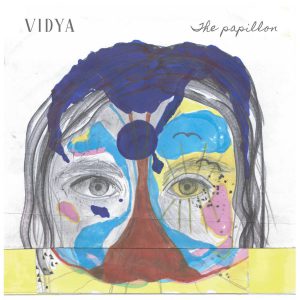 That’s a good question. Because it’s a lot that differs. If we take my first album Peace Play, it was about love in every single angle. It was things that I had been feeling and thinking up till then. So, it was a huge process, I would say. I actually recorded the songs myself first, and I sent it to a label and they were said, oh, yeah, but it would be nice if we had a band on this. And I was so angry because I thought it was finished. But I got out again, and we put together the band and we did that record.
That’s a good question. Because it’s a lot that differs. If we take my first album Peace Play, it was about love in every single angle. It was things that I had been feeling and thinking up till then. So, it was a huge process, I would say. I actually recorded the songs myself first, and I sent it to a label and they were said, oh, yeah, but it would be nice if we had a band on this. And I was so angry because I thought it was finished. But I got out again, and we put together the band and we did that record.
The second album, was a really long process. The songs were not just written in the moment, it was over a long time with the longing, the searching, finding, the losing. We also played the songs many times before we recorded them. I focussed on everything that I hadn’t been able to say, like that beyond feeling, which you can’t really grasp until you decide to. I actually wrote lyrics in the song booth, and was figuring out how to word these feelings. I kept thinking, this is now, it’s going to happen. It’s not going to happen. I went home during the lunch and wrote down some things. And I had to really look at the sheet. I wrote it down and I had to dig deep to really go to that core. Sometimes I didn’t really understand what I wrote. So, it was a much messier process for me to do this record.
And then coming to this album now. Was it a lot smoother? Did you feel because you had Rob there, was there more support there?
No, it was a, it was a very smooth process, because these are very skilled musicians. And they are very open. When I asked Rob to compose, it was just like, this is where I need to go. Everything was happening really fast, like in one or two takes and lyrics coming out. But I got the feeling that I when I was doing it, it was quite tough for me to dig and dig, you know, because I had to lead this process forward. I was clear inside what I wanted, but I hadn’t been thinking so much. But now I was digging and thinking while playing and doing the record, which was quite exhausting for me to do. One time, I got really angry because I thought they weren’t listening to me. And then afterwards, I actually talked to them about what I need for this album or process to be fun. Because at one point, I felt that it was not fun, because I had to dig deep and they didn’t really realize that strain for me. I had to take all of that and steer it in the right direction, because otherwise this album wouldn’t be what I wanted it to be, which takes a lot of energy. I am a physical person; I need to put my hand on someone and know that they are there. So that’s a tool I use. I needed a lot of contact, like direct eye contact so that I can know that we’re creating together. Maybe that’s a little bit too much. But I that’s how I did it.
What is the Swedish jazz scene like? What is the scene that you’re part of?
I think it’s a fun scene that I’m involved in. But then again, I choose exactly what I want to do and stay there. I think that maybe I’m not sure how it is for younger people. But I mean, younger people in general are more anxious about things. And you can tell that in music. But in Sweden, there’s so many talented musicians and you can almost just call up anyone and say, ‘Hey, I like your songs do you want to play?’ And they would maybe say yes. There aren’t many rules around who to call, then again, I don’t go to those people who might say no.
Does it feel like a welcoming space to go into?
I would say it is welcoming scene, as there are a lot of organisations and people working really hard to make it an open and healthy, physical, musical and mental jazz scene for all. That is a nice thing. I have no idea how other jazz scenes work, but I know that there are people working in the background to make it a welcoming space and to take care of the musicians, to give them a life of music. It can be difficult to get bookings and gigs, but that’s because there are so many incredible musicians and everyone wants to play. In Sweden right now we have a government that is not so fun, and they are cutting down on the cultural sector. Just recently, they took away a lot of funding for musicians, making it a lot harder for us. It is a huge setback for culture.
What do you have planned for the rest of this year?
I am starting up a theatre project this fall, we’re currently still working on it. It is about my story, which is really exciting as I have never done anything like this. We will start rehearsing and putting things together this fall. And then I am booking for 2025 with this band, an Adi Shakti tour. I also am starting up a project in India actually, and hopefully we will go with a band over there to play.
This interview was originally published in the July 2024 Women in Jazz Media Magazine
Photos provided by Vidya
Last modified: September 16, 2024


